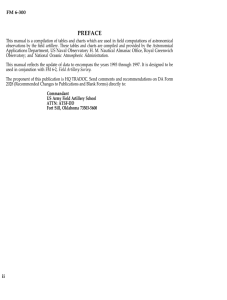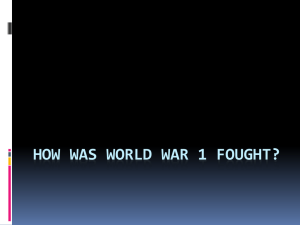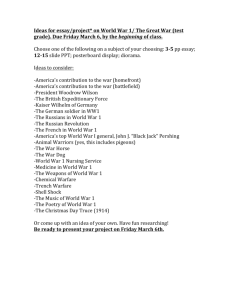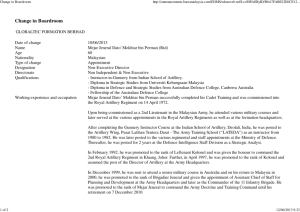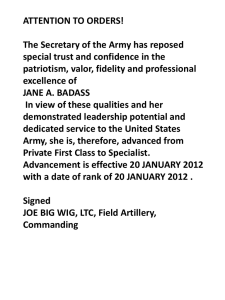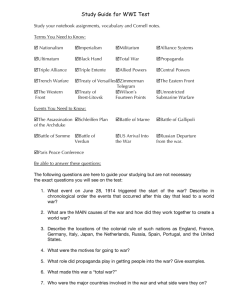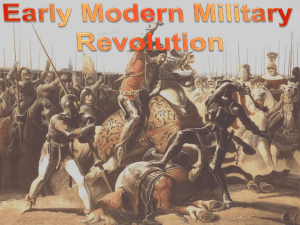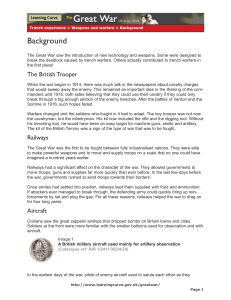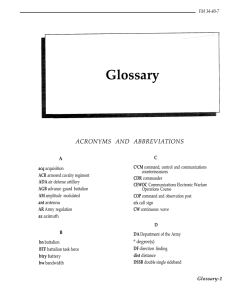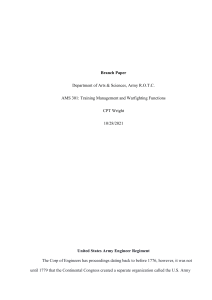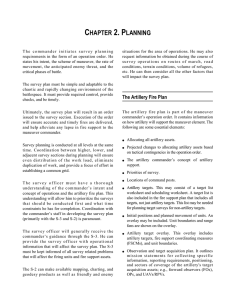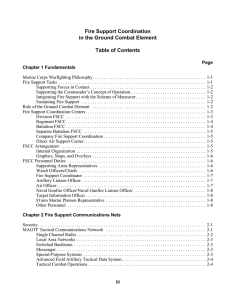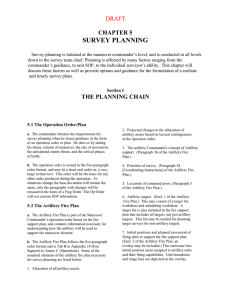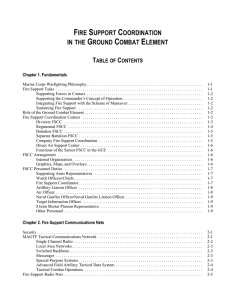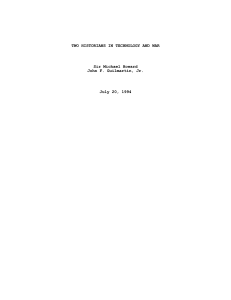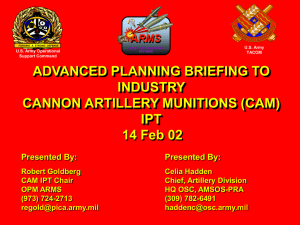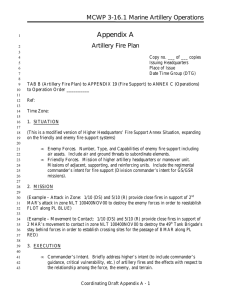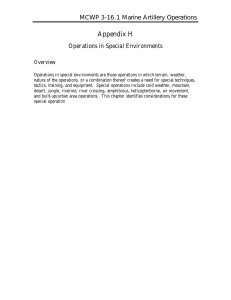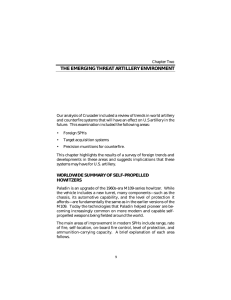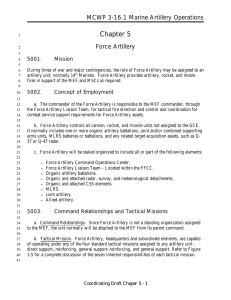anticipating the *inevitable war
advertisement
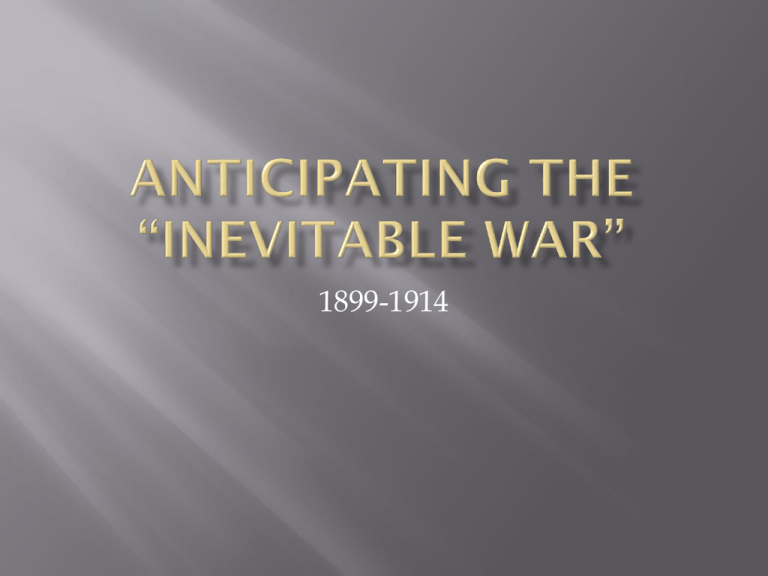
1899-1914 From colonial to industrial warfare A war between Europeans in South Africa 1895: the Jameson Raid British military tactics: processes used against non-European peoples (colonial warfare) Step 1: to provoke contact with the enemy Step 2: the use of superior firepower (riffles + machine guns + artillery) = swift destruction of the enemy The Boers: preemptive strikes into British-held territory British reinforcements = defensive tactic The good use of modern armament Lord Roberts’ overall military strategy: the occupation of enemy territory + the destruction of its resources + the deportation of civilians Phase 3: guerilla warfare Lord Kitchener: antiguerilla warfare against European populations Industrial warfare Rival imperial ambitions over Manchuria and Korea Russia: the need for a warm water port (Port Arthur) No compromise reached= war JAPAN RUSSIA 1- Frontal attacks unsuccessful due to 1- The massive use of artillery = modern rifles and machine-guns movements limited in daylight 2- War of attrition + disorganization of Russian lines = successes 2- The need to build a complex network of trenches + underground 3- The role of modern artillery: the fortifications number of firing rounds per minute increased dramatically + better 3- The evacuation of wounded made accuracy more difficult The use of the artillery + war of trenches Frontal attacks unsuccessful + heavy casualties Atrocities against civilian populations The Treaty of Westphalia (1648): the sovereignty of states International law: a weak concept until the mid 1860s 1864: THE FIRST GENEVA CONVENTION The Battle of Solferino (1859) Henri Dunant A peace conference for the limitation of armaments Safeguarding the human rights of individuals involved in armed conflicts Nicolas II The peaceful resolution of international conflicts Laws and customs for the conduct of war on land The extension of the Geneva Convention of 1864 to naval warfare “Hostilities [between nations] must not commence without previous and explicit warning” “The territory of a neutral power is inviolable.” The use of floating mines was forbidden The Court’s voluntary character Diplomatic crisis prior to 1914 NOT submitted to the process of international arbitration The public’s admiration for the Army and its leaders The fear of a devastating war Moltke “the elder”: future European war to last several years (1889) NO decisive battle “We have won our position through the sharpness of our sword, not through the sharpness of our mind” The Treaty of London (1839): Belgium neutrality guaranteed in perpetuity Impossible to manage and supply an army of millions for a long time = the need to win through a series of decisive military engagements Schlieffen: the use of reserve units in the front line against prevailing military doctrine to achieve superiority in numbers The French officer corps: “Les réserves, c’est zéro”!!! 1913 Field Regulations: “The French Army, returning to its tradition, henceforth admits no law but the offensive” No need for ‘defensive-minded’ officers in the French army General Joffre Colonel de Grandmaison: a defensive strategy = moral inferiority leading to defeat Correct assessment but… 30 years too soon!!! Offensive to the limit vs. machine-guns and heavy artillery “Big Bertha” (1911) The threat of the Russian steam roller on Germany’s eastern frontier Russia’s railways inadequate Inability to produce enough artillery shells and riffle cartridges Poor intelligence Poor organization & planning Promotion of officers through patronage European public opinions rejected the idea of war UNLESS The nation’s interests were to be threatened FATALISM War is a ‘biological necessity’ Germany must strike the first blow: France must be completely crushed General von Bernhardi INEVITABLE confrontation between Germanic and Slavic peoples The Russian menace over Germany Russian rearmament + investments in a strategic network of railways = the Schlieffen Plan threatened The idea of a PREVENTIVE WAR The loss of Alsace-Lorraine in 1871 NOT a cause for war with Germany Legislative elections (May 1914): progression of the Socialists Great enthusiasm in cities at the news of the German declaration of war (August 1) Saint-Petersburg renamed Petrograd The rural majority overwhelmingly ignorant or indifferent British public opinion preoccupied with internal crises Constitutional crisis over the powers of the House of Lords Widespread strikes + the suffragettes movement The question of Home Rule in Ireland Plans to commemorate the battle of Waterloo in 1915: one hundred years of peace 1912: a new magazine, The Peacemaker, to celebrate AngloGerman friendship The Great Illusion by Norman Angell (1910): economic interdependence of nations = war is unprofitable A 20th century war would be on such a scale to make war ‘unthinkable’ Fatalism BUT public opinions against the idea of war Less diplomatic tensions following the end of the second Balkan war The Sarajevo assassination: the spark
